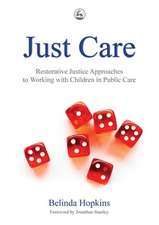Delinquent Girls: Contexts, Relationships, and Adaptation
Editat de Shari Miller, Leslie D. Leve, Patricia K. Kerigen Limba Engleză Hardback – 14 oct 2011
This breakthrough volume adds to the understanding of this population by offering empirical analysis not only of how these behaviors develop but also about what is being done to intervene. Employing multiple theoretical models, qualitative and quantitative data sources, law enforcement records, and insights across disciplines, leading scholars review causes and correlates; the roles of family and peers; psychological and legal issues; policy changes resulting in more arrests of young women; and evidence-based prevention and intervention strategies.
Each chapter covers its subject in depth, providing theory, findings, and future directions. Important topics addressed include:
- Narrowing the gender gap – trends in girls’ delinquency.
- Girls at the intersection of juvenile justice, criminal justice, and child welfare.
- Trauma exposure, mental health issues, and girls’ delinquency.
- Beyond the stereotypes: girls in gangs.
- Intervention programs for at-risk and court-involved girls.
- Implications for practice and policy.
Preț: 783.68 lei
Preț vechi: 955.70 lei
-18% Nou
Puncte Express: 1176
Preț estimativ în valută:
149.97€ • 162.85$ • 125.98£
149.97€ • 162.85$ • 125.98£
Carte tipărită la comandă
Livrare economică 23 aprilie-07 mai
Preluare comenzi: 021 569.72.76
Specificații
ISBN-13: 9781461404149
ISBN-10: 1461404142
Pagini: 220
Ilustrații: XVI, 204 p. 12 illus., 7 illus. in color.
Dimensiuni: 155 x 235 x 18 mm
Greutate: 0.49 kg
Ediția:2012
Editura: Springer
Colecția Springer
Locul publicării:New York, NY, United States
ISBN-10: 1461404142
Pagini: 220
Ilustrații: XVI, 204 p. 12 illus., 7 illus. in color.
Dimensiuni: 155 x 235 x 18 mm
Greutate: 0.49 kg
Ediția:2012
Editura: Springer
Colecția Springer
Locul publicării:New York, NY, United States
Public țintă
ResearchCuprins
Preface: Delinquent Girls, Relationships, and Ordinary Magic; M.K. Underwood.- Section I. Setting the Stage.- Stability and Change in Girls’ Delinquency and the Gender Gap: Trends in Violence and Alcohol Offending across Multiple Sources of Evidence; J. Schwartz, D. Steffensmeier.- Crossing Over: Girls at the Intersection of Juvenile Justice, Criminal Justice, and Child Welfare; J.L. Woolard.- Girls in the Juvenile Justice System: The Causes and Correlates of Girls’ Involvement; S.R. Hawkins.- Section II. Context and Relationships.- Juvenile Assault Arrestees and Their Incidents: Same and Opposite Gender Relationships; A.L. Stahl, P. Coontz.- Girlfriends, Gun-holders, and Ghetto Rats? Moving Beyond Narrow Views of Girls in Gangs; D. Peterson.- Girls’ Relational Orientation and Interpersonal Dynamics of Delinquency; S. Miller, D.-M. Winn, T. Wiki, J. Taylor.- Section III. Psychological Functioning.- Dealing with Double Jeopardy: Mental Health Disorders among Girls in the Juvenile Justice System ; E.G. Marston, M.A. Russell, I. Osbuth, G.K. Watson.- Trauma and Girls’ Delinquency; P.K. Kerig, S.P. Becker.- Section IV. Intervention and Implications for Practice and Policy.- Multidimensional Treatment Foster Care as an Intervention for Juvenile Justice Girls in Out-of-Home Care; L.D. Leve, P. Chamberlain, D.K. Smith, G.T. Harold.- Risk for Girls’ Delinquency: Early Intervention to Promote Healthy Development; A. Rubin-Vaughan, D. Pepler, M. Walsh, K. Levene, A. Yuile.- Addressing Girls Delinquency – Recommendations for Policymakers and Practitioners; J. Chiancone.
Notă biografică
Dr. Shari Miller received her doctorate in Clinical Psychology from the University of Virginia in 1991. She is a research psychologist in RTI’s Crime, Violence, and Justice Program. Dr. Miller’s primary focus is on youth violence and delinquency. Specific activities include basic research, prevention and intervention, and program evaluation. Her major research interests include design, implementation, and evaluation of delinquency and youth violence interventions; adolescent problem behaviors (including substance use, teen pregnancy, and high-risk sexual behaviors); service delivery systems related to the mental health needs of juvenile justice youth; pathways and risk processes leading to adolescent problem behaviors; the intersection of maltreatment and delinquency; and violence and delinquency among girls. She received a Career Development Award from the National Institutes of Mental Health to study the development, processes, and mechanisms of girls’ antisocial behavior.
Dr. Leslie Leve received her doctorate in Developmental Psychology from the University of Oregon in 1995. She is a Senior Scientist at the Oregon Social Learning Center and at the Center for Research to Practice in Eugene, OR. Dr. Leve’s work has focused on the development of effective treatment models for youth in foster care and youth in the juvenile justice system. She has served as an investigator on 12 research grants funded by the National Institutes of Health, including longitudinal studies of normative developmental processes and randomized preventive intervention trials with at risk populations. She currently directs a randomized intervention trial designed to prevent the onset of delinquency among girls in foster care as they enter middle school. Dr. Leve has published numerous articles and chapters in the areas of child development and Multidimensional Treatment Foster Care.
Dr. Patricia Kerig received her Ph.D. in Clinical Psychology from the University of California at Berkeley in 1989. Currently, she is a Professor and the Director of Clinical Training in the Department of Psychology at the University of Utah. Her research focuses on developmental psychopathology in the context of the family, and she is the author of a number of books, chapters, and empirical articles concerning risk and resilience in children and adolescents exposed to family violence, interparental conflict, child maltreatment, and trauma. Her most recent research projects concern understanding the underlying mechanisms that link trauma, PTSD, and juvenile delinquency, as well as developing empirically-supported strategies for integrated trauma-informed and family systems approaches for diverting traumatized youth from a delinquent pathway.
Dr. Leslie Leve received her doctorate in Developmental Psychology from the University of Oregon in 1995. She is a Senior Scientist at the Oregon Social Learning Center and at the Center for Research to Practice in Eugene, OR. Dr. Leve’s work has focused on the development of effective treatment models for youth in foster care and youth in the juvenile justice system. She has served as an investigator on 12 research grants funded by the National Institutes of Health, including longitudinal studies of normative developmental processes and randomized preventive intervention trials with at risk populations. She currently directs a randomized intervention trial designed to prevent the onset of delinquency among girls in foster care as they enter middle school. Dr. Leve has published numerous articles and chapters in the areas of child development and Multidimensional Treatment Foster Care.
Dr. Patricia Kerig received her Ph.D. in Clinical Psychology from the University of California at Berkeley in 1989. Currently, she is a Professor and the Director of Clinical Training in the Department of Psychology at the University of Utah. Her research focuses on developmental psychopathology in the context of the family, and she is the author of a number of books, chapters, and empirical articles concerning risk and resilience in children and adolescents exposed to family violence, interparental conflict, child maltreatment, and trauma. Her most recent research projects concern understanding the underlying mechanisms that link trauma, PTSD, and juvenile delinquency, as well as developing empirically-supported strategies for integrated trauma-informed and family systems approaches for diverting traumatized youth from a delinquent pathway.
Textul de pe ultima copertă
Traditionally, delinquent girls were considered an anomaly, a rare phenomenon attracting little scholarly notice. Today, more than one in four youth offenders is female, and researchers and practitioners alike are quickly turning their attention and resources to address this challenging situation. Delinquent Girls: Contexts, Relationships, and Adaptation synthesizes what is known about girls involved in delinquent behavior and their experiences at different points in the juvenile justice system.
This breakthrough volume adds to the understanding of this population by offering empirical analysis not only of how these behaviors develop but also about what is being done to intervene. Employing multiple theoretical models, qualitative and quantitative data sources, law enforcement records, and insights across disciplines, leading scholars review causes and correlates; the roles of family and peers; psychological and legal issues; policy changes resulting in more arrests of young women; and evidence-based prevention and intervention strategies.
Each chapter covers its subject in depth, providing theory, findings, and future directions. Important topics addressed include:
This breakthrough volume adds to the understanding of this population by offering empirical analysis not only of how these behaviors develop but also about what is being done to intervene. Employing multiple theoretical models, qualitative and quantitative data sources, law enforcement records, and insights across disciplines, leading scholars review causes and correlates; the roles of family and peers; psychological and legal issues; policy changes resulting in more arrests of young women; and evidence-based prevention and intervention strategies.
Each chapter covers its subject in depth, providing theory, findings, and future directions. Important topics addressed include:
- Narrowing the gender gap – trends in girls’ delinquency.
- Girls at the intersection of juvenile justice, criminal justice, and child welfare.
- Trauma exposure, mental health issues, and girls’ delinquency.
- Beyond the stereotypes: girls in gangs.
- Intervention programs for at-risk and court-involved girls.
- Implications for practice and policy.
Caracteristici
Focuses on deep-end delinquent behavior in girls
Addresses issues of delinquent girls at multiple points in the juvenile justice system, from arrest to adjudication to out-of-home placement to detention
Examines data sources and methodologies, including administrative record data on arrests, in-depth qualitative analysis, intervention studies, and quantitative approaches
Explores such interrelated topics as legal issues, the role of relationships and context, mental health problems, trauma exposure, prevention/intervention, and policy implications
Includes supplementary material: sn.pub/extras
Addresses issues of delinquent girls at multiple points in the juvenile justice system, from arrest to adjudication to out-of-home placement to detention
Examines data sources and methodologies, including administrative record data on arrests, in-depth qualitative analysis, intervention studies, and quantitative approaches
Explores such interrelated topics as legal issues, the role of relationships and context, mental health problems, trauma exposure, prevention/intervention, and policy implications
Includes supplementary material: sn.pub/extras
















